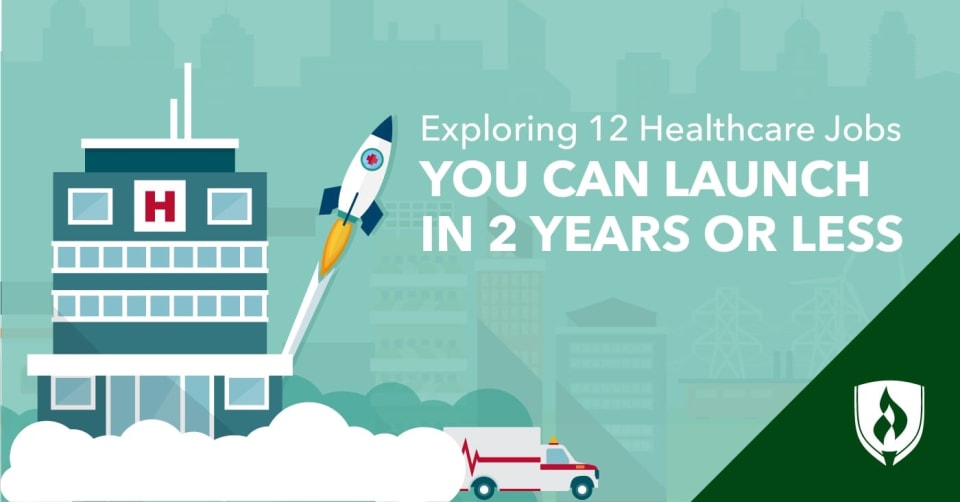
Working in healthcare has certainly captured your imagination for a while now. You know there are plenty of roles in the healthcare field, from the reception desk on up to the hospital c-suite, but finding the right opportunity for you can be a little trickier.
While there’s a lot to weigh when considering a potential career, you do know you’d prefer to find a role that can help get you into the field quickly. That makes perfect sense—a rock-solid healthcare job that requires comparatively little schooling is an ideal combo.
But do these jobs actually exist? The good news is that there actually are several in-demand, medical-field jobs that require only a “two-year” Associate’s degree or less.
To help you narrow down your search, we’ve compiled a helpful list of top medical field jobs that don’t require a Bachelor’s degree.
12 Quality healthcare jobs that don’t require a Bachelor’s degree
This list offers a snapshot of 12 in-demand healthcare careers that will allow you to start earning a paycheck and helping people with an Associate’s degree or less. Keep reading to learn a bit about each of these jobs in the medical field, and see which careers align best with your skills and interests.
1. Registered nurse (RN)
One of the many reasons to pursue a career as a registered nurse is that you’ll be on the frontline of care. There are many opportunities for nurses with Associate's degrees, and the career offers a variety of specialties and career paths. Don’t let the tests and assessments scare you off; there are plenty of resources to help you pass the ever-important NCLEX-RN exam.
Projected employment growth (2023 to 2033): 6 percent1
Education needed: Associate's degree at a minimum
2. Nursing assistant
Nursing assistants work under the supervision of the nursing staff to provide basic care for patients in a variety of settings. This is a low barrier-to-entry option to obtaining a career in the healthcare field that typically requires a training program that can be completed in weeks, not months. That said, this role doesn’t come with quite as much of a salary punch.
Projected employment growth (2023–2033): 4 percent1
Education needed: Non-degree training program
3. Medical administrative assistants
Don’t expect medical administrative assistants to just punch away at a keyboard and fill coffee mugs. They actually provide medical-specific administrative support, including communicating with patients and managing medical charts, plus scheduling appointments, directing visitors and more.
Projected employment growth (2020–2030): 10 to 15 percent2
Education needed: Medical Administrative Assistant certificate
4. Medical assistant
Medical assistants may sometimes be confused with medical secretaries due to their sometimes-shared responsibility for medical-related administrative duties. Their work often extends beyond the administrative realm to include patient-care duties, such as drawing blood, recording vital signs and administering medication. The additional responsibilities can make it even more helpful for them to have medical-specific training.
Projected employment growth (2020–2030): 15 percent1
Education needed: Medical Assisting diploma
5. Health information technician (HIT)
Health information technicians who can process medical information and manage records will be paramount as baby boomers age and the number of new patients increases. The healthcare industry’s transition to universally using electronic health records creates a demand for trained professionals to maintain, organize and protect critical healthcare records and data.
Projected employment growth (2020–2030): 5 to 10 percent2
Education needed: Health Technician Associate's degree
6. Licensed practical nurse (LPN)
Licensed practical nurses play an important role in our healthcare system as they handle a large portion of basic nursing care tasks. This lower-level nursing position still comes with plenty of responsibilities—they monitor patient health, change dressings and catheters, administer medications and assist with personal care as needed. Many LPNs work in long-term care or assisted living facilities, but they can also be found in physician’s offices and hospitals.
Projected employment growth (2023–2033): 3 percent1
Education needed: Practical Nursing diploma
7. Pharmacy technician
Pharmacy technicians perform a variety of tasks to support pharmacists with disbursement of medications to prescription holders, including taking orders from customers and counting out medication. These healthcare professionals are the friendly faces you’ll find at the front of a pharmacy counter.
Projected employment growth (2023–2033): 7 percent1
Education needed: Pharmacy Technician certificate
8. Medical or clinical laboratory technician
You’ve probably had a trip to the doctor where the next steps in your treatment would depend on the results from “the lab.” So what will you find at this lab? Medical laboratory technicians. These healthcare professionals assist with the analyses and diagnoses of patients from mostly behind-the-scenes laboratory settings. If you were the type to love hands-on lab work in science classes, you might enjoy the work of a medical lab tech. In fact, there is a lot to love about a career as a med lab tech.
Projected employment growth (2023–2033): 5 percent1
Education needed: Medical Laboratory Technician Associate's degree
9. Radiologic technologist
Radiologic technologists work with physicians to perform diagnostic imaging examinations on patients. They work directly with patients to conduct X-ray or CAT scan procedures and use many types of medical machinery to obtain the imagery needed for proper diagnosis and treatment.
Projected employment growth (2023–2033): 6 percent1
Education needed: Radiologic Technologist Associate's degree
10. Surgical technologist
Surgical technologists perform a crucial role as a part of the surgical team. In addition to prepping the operating room for surgery, their days are spent on the front lines of the action, literally providing hands-on assistance throughout life-saving surgeries. A sense of satisfaction from saving lives is just one of many perks of being a surgical technologist.
Projected employment growth (2023–2033): 6 percent1
Education needed: Surgical Technologist Associate's degree
11. Physical therapist assistant (PTA)
Physical therapist assistants are the healthcare professionals who help patients recover from injuries and illnesses that limit their mobility or cause pain in their everyday lives. They work directly with patients as they carry out rehabilitation exercises and stretches and report progress to overseeing physical therapists. These healthcare professionals are projected to see a substantial boost in employment as the large baby boomer generation ages and faces mounting mobility issues.
Projected employment growth (2023–2033): 19 percent1
Education needed: Physical Therapist Assistant Associate's degree
12. Medical coder
Medical coders serve as a critical bridge to the healthcare and billing process. Transcribing medical notes on what procedures or services were done in appointments, medical coders apply ICD-10 codes for billing and insurance purposes.3
Projected employment growth (2023–2033): 9 percent
Education needed: Medical Billing and Coding certificate
A faster path into the healthcare field
It’s clear that pursuing a career in healthcare doesn’t have to equate to spending several years in school. There are several health science options when it comes to medical-field jobs you can land with an Associate’s degree, diploma or less. All of these different choices may make your career search overwhelming, but the variety of options also means you’re bound to find a position that’s the perfect fit for you. Check out our article, "6 Entry-Level Hospital Jobs You Can Start Sooner Than You Think".
Curious about what you can do with a healthcare associate's degree? Check out our article for some options.
Ready to take the next step? Rasmussen University can help. Request more information today to hear more from an admissions advisor and get the process started.
1Bureau of Labor Statistics, U.S. Department of Labor, Occupational Outlook Handbook, [accessed June 2022] www.bls.gov/ooh/. Data represents national, averaged earnings for the occupations listed and includes workers at all levels of education and experience. Employment conditions in your area may vary.
2Bureau of Labor Statistics, U.S. Department of Labor, Occupational Employment Statistics, [accessed June 2022] www.bls.gov/oes/. Data represents national, averaged earnings for the occupations listed and includes workers at all levels of education and experience. Employment conditions in your area may vary.
3Most coding positions are not considered "entry level"; a combination of education and work experience is typically required to attain a coding position.
EDITOR’S NOTE: This article was originally published in 2014. It has since been updated.




